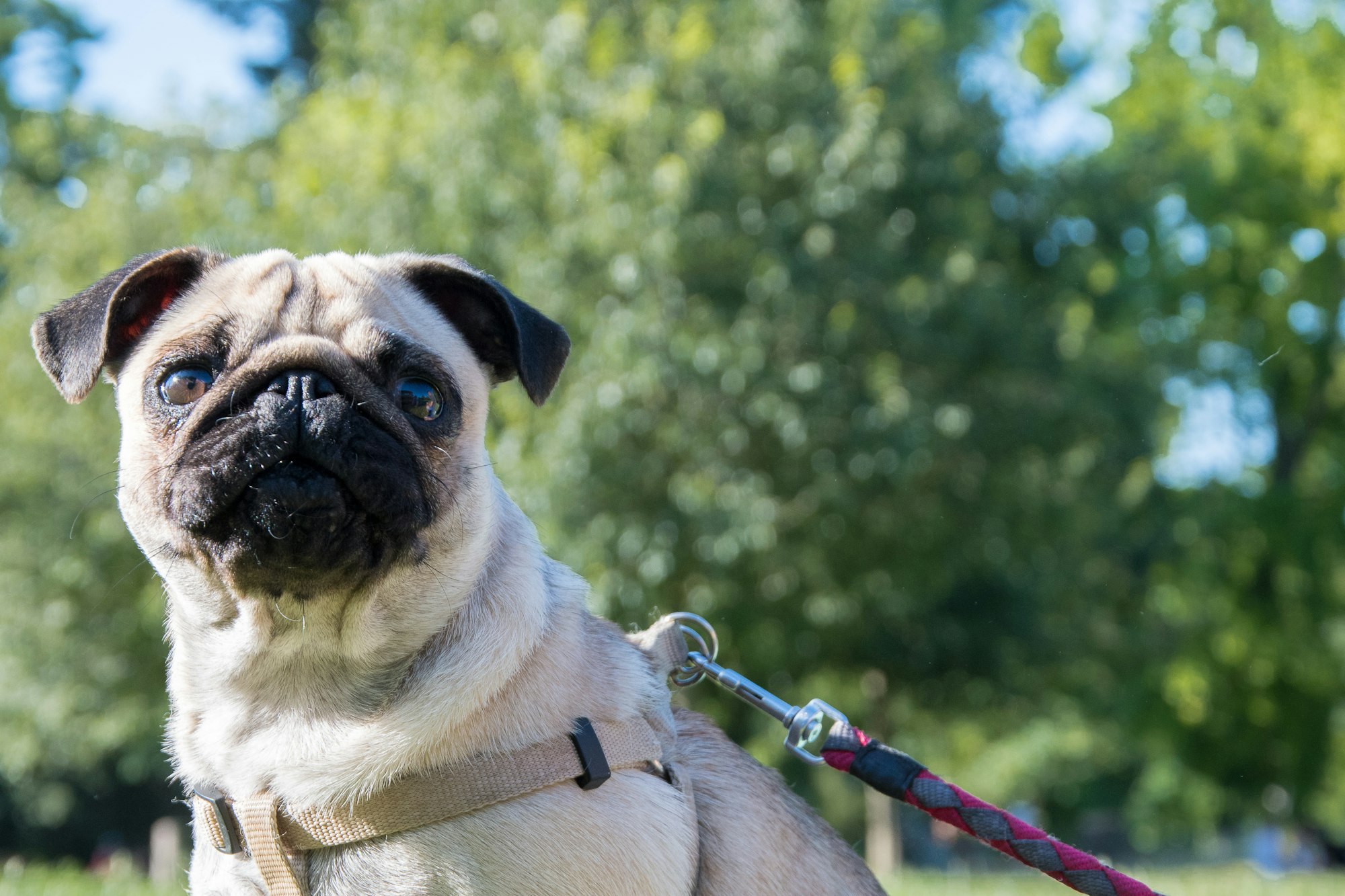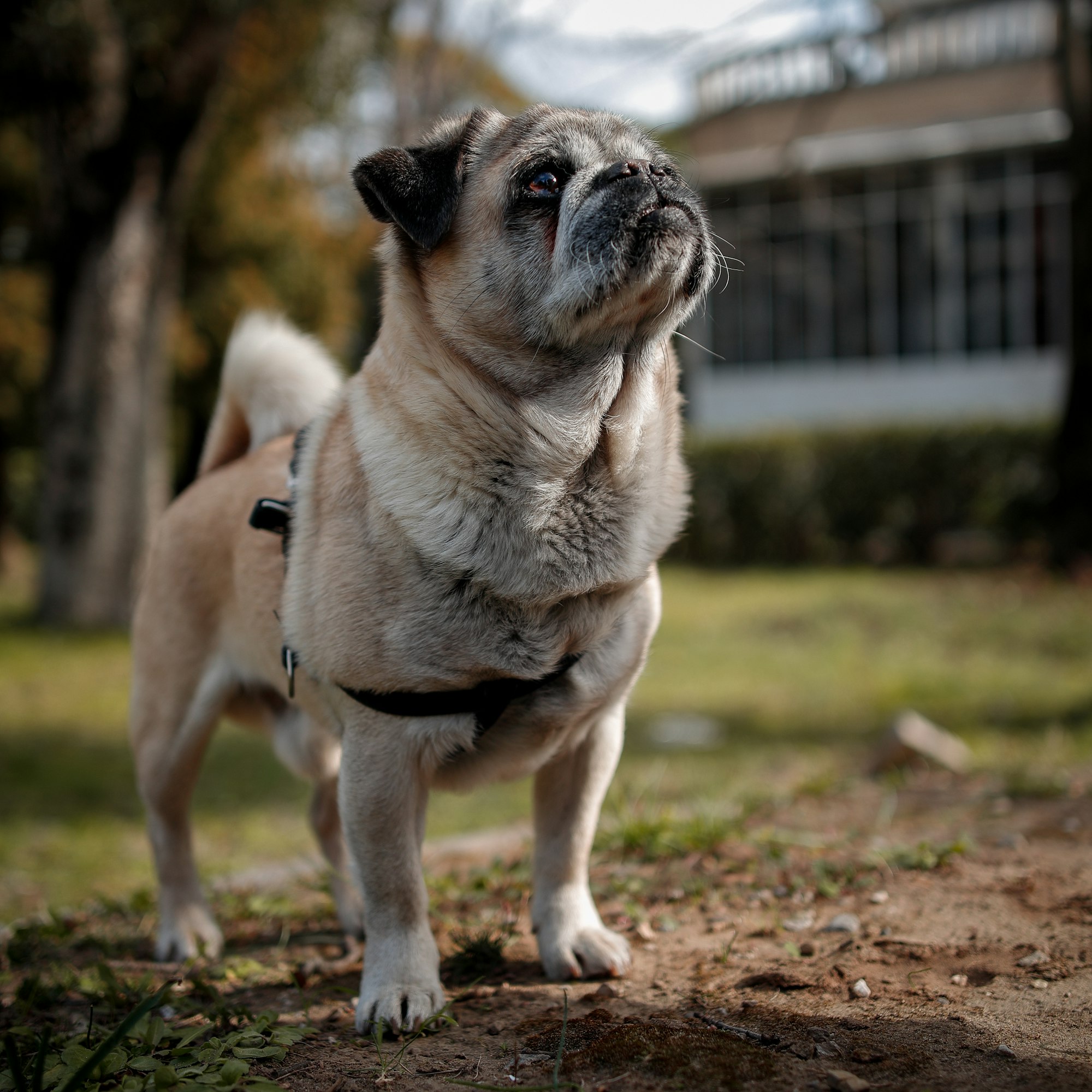Pugs, with their unique appearance and endearing personalities, have gained quite a following as popular companion dogs. However, when it comes to their intelligence, there is often debate and curiosity surrounding the capabilities of these adorable canines. In this article, we will explore the question: Are Pugs smart?

To understand Pug intelligence, it is essential to consider the factors that contribute to intelligence in dogs in general. Genetics play a significant role, as certain breeds are known for their higher intelligence levels. training and socialization, as well as the overall health and well-being of a dog, can impact their cognitive abilities.
Before diving into Pug intelligence specifically, it is important to explore the general characteristics of Pugs. From their physical appearance to their temperament and personality traits, understanding these aspects can provide valuable insights into their overall intelligence.
So, to address the primary question weather pugs are smart or not, to determine this, we need to examine the average intelligence of Pugs and compare it to other breeds. Factors like problem-solving abilities, trainability, and learning potential are crucial in assessing a dog's intelligence.
Furthermore, we will explore the various factors that can affect a Pug's intelligence, including genetics, training, and socialization. It is important to note that while genetics may influence a dog's potential intelligence, proper training and socialization play a significant role in developing and enhancing their cognitive abilities.
To dispel any misconceptions about Pug intelligence, we will address common myths or misunderstandings surrounding their cognitive capabilities. Shedding light on these misconceptions can provide a clearer understanding of what to expect in terms of Pug intelligence.
Lastly, we will delve into other aspects of Pug intelligence beyond problem-solving and learning abilities. Emotional intelligence, problem-solving skills, and communication abilities are vital components of a dog's overall intelligence, including Pugs.
By exploring these aspects of Pug intelligence, we aim to provide a comprehensive understanding of their cognitive capabilities and shed light on the question of whether Pugs are, indeed, smart dogs.
Key takeaways:
- Pug intelligence varies: While pugs may not be considered the smartest breed overall, individual pugs can display varying levels of intelligence.
- Factors affecting pug intelligence: Genetics, training, socialization, and health can all impact a pug's intelligence and ability to learn.
- Pugs excel in other areas: Pugs may compensate for lower intelligence with their emotional intelligence, problem-solving abilities, and strong communication skills.
Are Pugs Smart?
Pugs are often asked, "Are Pugs Smart?" Well, they are regarded as a breed with average intelligence. While they may not top the charts in terms of problem-solving ability or trainability, Pugs compensate with their lovable personalities and adaptability. Pugs are known to be affectionate and good-natured, which makes them great companions for families and individuals alike.
When it comes to social interactions, Pugs excel and have a strong desire to please their owners. It is important to note that intelligence can vary among individual dogs, and proper training and mental stimulation are essential to cultivate their potential.
A pro-tip for maximizing a Pug's learning capabilities is consistent positive reinforcement training. So, to answer the question, "Are Pugs Smart?" they may not be the smartest breed, but they possess other wonderful qualities that make them incredibly special.
Understanding Pug Intelligence
Understanding Pug Intelligence is crucial when discussing the intelligence of these adorable dogs. Although pugs may not be at the top of the intelligence scale, they are generally considered to be intelligent. To truly grasp their intelligence, it is important to recognize their distinctive traits and behaviors. Pugs are exceptionally social and have the ability to form strong bonds with their owners. When it comes to basic obedience commands, they are quick learners.
However, their stubborn streak can sometimes pose a challenge during training sessions. Regardless of this, pugs excel in emotional intelligence and adaptability. Assessing Pug Intelligence should be based on their individual strengths and abilities.
I vividly remember my pug, Bella, who amazed me with her problem-solving skills. Once, I accidentally dropped a treat under the couch, and I couldn't reach it. But Bella, being a clever little pug, fetched a long stick and skillfully flicked the treat out from under the couch. It was an incredible demonstration of her resourcefulness and intelligence. Truly understanding Pug Intelligence means appreciating these smart and sometimes unexpected moments that showcase their unique capabilities.

What Factors Contribute to Intelligence in Dogs?
Multiple factors contribute to intelligence in dogs. Genetics play a significant role, as certain breeds are known to possess higher intelligence, such as Border Collies and Poodles. Training and socialization also play a crucial part in developing a dog's intelligence.
Providing mental stimulation through activities, puzzles, and obedience training can enhance a dog's cognitive abilities. A happy dog's overall health and well-being can impact their intelligence. A balanced diet, regular exercise, and proper healthcare contribute to a dog's mental acuity. It is important to recognize that intelligence in dogs can vary, and it is not solely determined by breed.
Characteristics of Pugs
Pugs, these adorable little canines, have some distinctive traits that set them apart. Let's dive into the fascinating world of pug characteristics. From their physical attributes to their unique temperament and personality, we'll unravel what makes these dogs so interesting and lovable. So, get ready to discover the charm and quirks of pugs that make them a beloved breed among dog enthusiasts worldwide.
Physical Characteristics
Pugs are easily recognizable by their distinctive physical characteristics, which contribute to their charm and popularity. Here are some key features of their physical appearance:
- Short and compact body: Pugs display a sturdy build with a low-slung and square-shaped body.
- Flat, wrinkled face: They possess a unique and adorable expression due to their flat face and wrinkled forehead.
- Bulbous eyes: Pugs are renowned for their large, round, and expressive eyes.
- Rose or button-shaped nose: The typical Pug has a short, black nose that can be rose-shaped or button-shaped.
- Curled tail: Their tightly curled tail is elegantly carried over their back.
- Double coat: Pugs feature a soft, fine undercoat along with a slightly coarser outer coat, which can exhibit various colors like black, white, and more.
Temperament and Personality
Pugs are renowned for their friendly and affectionate temperament, which makes them exceptional companion dogs. They possess a playful and mischievous personality, often described as "clowns." With their generally good-natured disposition, Pugs easily get along with children and other pets. They thrive on attention and absolutely love being the center of attention, making them the perfect pets for individuals or families seeking a loyal and entertaining companion. Additionally, Pugs are highly regarded for their loyalty and adaptability, allowing them to seamlessly adjust to different environments and living situations. It is crucial to provide proper training and socialization to ensure a well-rounded and balanced pug.
Pro-tip: To keep your pug happy, it's essential to provide them with mental and physical stimulation through playtime and interactive dog toys. Due to their sensitive nature, positive reinforcement training techniques are the most effective for pugs.
Are Pugs Considered Smart Dogs?
Pugs are known for their charming personalities, but when it comes to intelligence, they may not be at the top of the list. While pugs are not typically considered the smartest dogs, they have their own unique qualities that make them lovable companions. Pugs are often described as being more stubborn and independent, which can sometimes make training a bit more challenging. Their affectionate nature and ability to connect with their owners make up for any lack of intelligence. Ultimately, whether a dog is considered "smart" or not depends on individual preferences and what you value in a pet.
What is the Average Intelligence of Pugs?
The average intelligence of Pugs is considered to be on the lower side compared to other dog breeds. When it comes to the question "What is the Average Intelligence of Pugs?" it is important to note that while they are known for their charming and playful personalities, Pugs may not excel in tasks that require high levels of problem-solving or obedience.
It is crucial for Pug owners to focus on training and socialization to help cultivate their dog's intelligence and overall mental well-being. By providing mental stimulation and engaging activities, Pugs can still lead happy and fulfilling lives. It is also worth considering that intelligence can vary within a breed, and individual Pugs may display different levels of intelligence.
Factors that Affect Pug Intelligence
When it comes to pug intelligence, several factors come into play. Genetics, training, socialization, and their overall health and well-being all contribute to how smart these adorable companions can be. We'll dig into each of these elements, exploring how genetics shapes their cognitive abilities, the importance of training and socialization in unlocking their potential, and how their overall health impacts their mental sharpness. So, if you've ever wondered what makes pugs tick, let's dive into the fascinating world of pug intelligence together!
Genetics
Genetics play a significant role in determining the intelligence of pugs. Different genetic factors control various aspects of their cognitive abilities. For instance, specific genes may have an influence on problem-solving skills, while others may impact their capacity to acquire and retain information.
Pugs with a strong genetic predisposition for intelligence may excel in obedience trials and demonstrate higher levels of adaptive intelligence. To enhance the overall intelligence of the breed, proper breeding practices should prioritize selecting pugs with desirable genetic traits. This involves incorporating genetic diversity and avoiding excessive inbreeding in order to cultivate intelligence in pugs.
Training and Socialization
Training and socialization are essential for the development of a well-behaved and balanced Pug. It is important to start training early and begin basic obedience training as soon as possible. This will help establish boundaries and teach essential commands to your Pug.
- Positive reinforcement techniques, such as treats and praise, should be used to motivate and reward good behavior during training.
- To promote positive interactions and build social skills, it is crucial to expose your Pug to other dogs in controlled environments.
- Introducing your Pug to different environments, including various sights, sounds, and people, can help them become more adaptable and confident.
- Consistency is key. It is important to maintain consistent training methods and routines to effectively reinforce desired behaviors in your Pug.
- Training takes time and effort, so patience and persistence are important. Understand that it is a gradual process.
Health and Well-being
Ensuring the health and well-being of pugs is paramount for their overall intelligence and cognitive abilities. Here are some vital factors to consider:
- Diet: Providing a well-balanced and nutritious diet is crucial for maintaining their physical and mental health.
- Exercise: Regular physical activity is essential to stimulate their minds and prevent obesity.
- Mental stimulation: Engaging pugs in interactive play and puzzles is an effective way to keep their minds active and prevent boredom.
- Grooming: Regular grooming, including coat brushing and ear cleaning, is necessary for their overall well-being.
- Regular vet check-ups: Scheduling regular visits to the vet is important to monitor their health and detect any potential issues early on.
Pro-tip: Remember that a pug's health and well-being directly impact their alertness, responsiveness, and cognitive abilities.
Common Misconceptions about Pug Intelligence
There are common misconceptions about pug intelligence that need to be addressed:
- Pugs are not smart: This is a misconception. While pugs may not excel in obedience training, they are intelligent in their own way.
- Size doesn't determine intelligence: Pugs are small in size, but that doesn't mean they lack intelligence. Intelligence is not solely based on physical attributes.
- Personality matters: Pugs are known for their playful and affectionate nature, which may be mistaken for lack of intelligence. Their ability to connect emotionally is a sign of intelligence.
- Trainability varies: Some pugs may be more stubborn than others, but with consistent and positive reinforcement training, they can learn and perform various tasks.
Other Aspects of Pug Intelligence
While we already know that pugs are incredibly adorable, there's more to their intelligence than meets the eye. In this section, we'll explore the other aspects of pug intelligence that go beyond their cute faces. From their emotional intelligence to their problem-solving abilities and communication skills, we'll uncover the fascinating dimensions of pug intellect that often go unnoticed. Get ready to be amazed by how these little dogs bring more than just cuteness to the table!
Emotional Intelligence
Emotional intelligence is an essential component of pug intelligence. Pugs are renowned for their capacity to naturally understand and establish emotional connections with their owners. They possess a remarkable ability to empathize and perceive their owner's emotions.
Pugs exhibit immense affection and loyalty, resulting in them being able to offer comfort and support during challenging times. This exceptional emotional intelligence enables them to excel as therapy dogs and serve as companions for individuals facing emotional or mental health difficulties. The Pugs' capability to comprehend and react to their owner's emotions stands as a true reflection of their inherent emotional intelligence.
Problem-Solving Abilities
Pugs possess remarkable problem-solving abilities, which contribute to their high level of intelligence and adaptability as pets.
- One noteworthy aspect of Pugs is their resourcefulness. They are known to exhibit extraordinary creativity in finding solutions to various challenges or puzzles.
- Moreover, Pugs showcase their problem-solving skills by quickly grasping and executing new tricks and commands, demonstrating their aptitude for learning.
- Additionally, their adaptability is evident as Pugs can easily navigate different situations and environments, thanks to their problem-solving abilities.
- To further enhance their problem-solving capabilities, one can engage Pugs in stimulating problem-solving games, such as interactive games or puzzle toys.
Communication Skills
Effective communication skills are important for any dog breed, including Pugs. Pugs are known for their ability to communicate with their owners through various behaviors and expressions. Here are some of the top communication skills that Pugs possess:
- Facial Expressions: Pugs are highly expressive dogs and often convey their emotions through their eyebrows raising or eyes widening.
- Body Language: Pugs effectively use their body language, including tail wagging, body positioning, and ear movement, to communicate their intentions and feelings.
- Vocalization: Pugs are famously recognized for their distinctive barks and grunts, which they utilize to express different needs and emotions, such as excitement, fear, or discomfort.
- Eye Contact: Pugs have a remarkable ability to establish eye contact, which is crucial for communication between dogs and humans.
- Understanding Nonverbal Cues: Pugs are remarkably attentive and can easily pick up on subtle cues from their owners, enabling them to respond appropriately and communicate effectively.
Pugs may not excel in obedience trials or complex commands, but their outstanding communication skills make them excellent companions and beloved family pets.

Frequently Asked Questions
Are Pugs considered smart?
According to the American Psychological Association, intelligence is defined as the ability to acquire and apply knowledge, think abstractly and creatively, solve problems, and learn from experience. Pugs are ranked as the 57th most intelligent dog breed according to Stanley Coren's Dog Intelligence Ranking, placing them in the "Fair Working/Obedience Intelligence" category. So while they may not be considered the smartest breed, they are far from being the dumbest.
How is canine intelligence measured?
Canine intelligence is measured based on their ability to learn new commands, problem-solving skills, and adaptability. In the case of Pugs, Stanley Coren, a canine psychologist, used obedience trials to measure their intelligence. Dog breeds were ranked based on the number of repetitions it took to learn a new command and the success rate of obeying a known command on the first try. Pugs ranked 108th out of 138 breeds in these trials, placing them in the below average intelligence class.
Can Pugs learn new tricks easily?
Pugs may not be the easiest breed to train when it comes to learning new commands. According to the obedience trials conducted by Stanley Coren, it takes Pugs between 40 to 80 repetitions to learn a new command. However, it's important to remember that intelligence is not solely based on learning new tricks. Pugs have other qualities, such as high adaptive intelligence and great communication skills, that make them excellent companions.
Do Pugs understand human emotions?
Yes, Pugs are known for their high adaptive intelligence, which means they are great at reading human emotions and communicating with their owners. They have a unique ability to understand and respond to their owner's emotions, making them very empathetic pets.
Are Pugs easy to train?
While Pugs may not be the easiest breed to train in terms of learning new commands, they can still be trained with patience and consistency. The time it takes to train a Pug can vary depending on factors such as their learning speed and the owner's consistency in training. It's important to use positive reinforcement techniques and to be patient and persistent during the training process.
Do Pugs have any genetic shortcomings affecting their intelligence?
There are no genetic shortcomings specifically affecting the intelligence of Pugs. However, it's worth mentioning that they are a brachycephalic breed, meaning they have a shortened muzzle and a compressed airway. This can sometimes lead to health issues that may indirectly impact their learning abilities or overall quality of life. Nonetheless, with proper care and training, Pugs can still be wonderful and loving pets.

